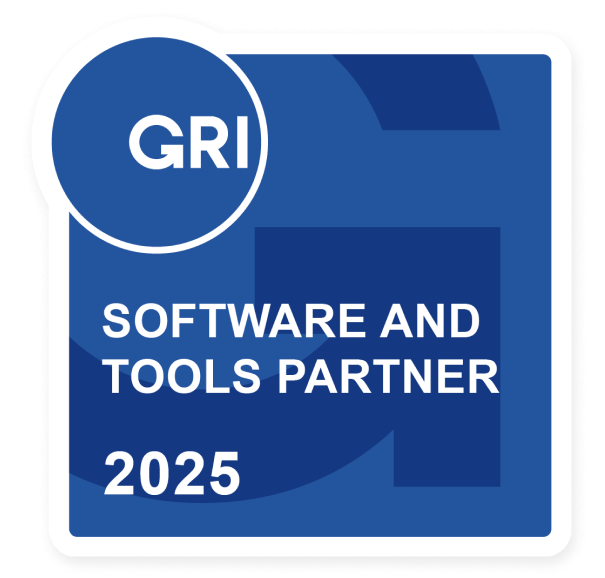ESG Reporting with GRI:
The global leader in sustainability reporting
Embrace sustainability with confidence
Generation Impact is the first Swiss software company licensed by GRI. Available in 10 languages.

What our clients say about our solution

“(…) GIG’s software has been instrumental in transforming how we approach sustainability, providing robust tools that streamline our data collection, analysis, and reporting processes. (…)”

United Manganese of Kalahari (UMK)
Malcolm Curror (CEO)

“The GRI solution exceeded expectations! Also, the team was professional, efficient, and attentive to every detail. I highly recommend them for their quality, reliability, and excellent customer experience.”
DataPack SA de CV
María Guerrero (ESG Manager)
Understanding the Global Reporting Initiative (GRI)
The Global Reporting Initiative (GRI) is an independent international non-profit organisation that helps businesses, governments, and other organisations communicate their environmental, social, and governance (ESG) impact transparently.
Universal and Well-Established
The GRI standards are among the most widely used sustainability reporting frameworks, with over 10,000 organisations across 100+ countries relying on them.
They apply to businesses of all sizes, as well as governments and non-profits, helping them measure impact and track sustainability progress.
Perfect for newcomers and experienced reporters alike
GRI makes ESG reporting accessible, even for those with limited experience, by providing a clear and flexible structure. Organizations can either fully comply with GRI in accordance or use the standards as a reference.
Scalable and inclusive
GRI makes ESG reporting accessible, even for those with limited experience, by providing a clear and flexible structure. Organizations can either fully comply with GRI in accordance or use the standards as a reference.
How to use GRI Standards for ESG Reporting
Begin by identifying the most relevant ESG topics based on industry impact, business priorities, and stakeholder expectations. The framework provides a structured approach, guiding the process of data collection, disclosure, and report creation.
Read more
Key Benefits
of the Generation Impact Global GRI Tool

Efficiency and impact
GRI reporting helps organisations assess, manage, and communicate their sustainability impact in a structured and transparent way.

Trust and credibility
With increasing scrutiny from investors, regulators, and stakeholders, organisations that provide clear, data-driven ESG disclosures can enhance their reputation and attract long-term investment.

Competitive advantage
Organisations that adopt GRI are better positioned to meet compliance requirements, manage risks, and integrate sustainability into their business strategy.

Generation Impact Global and GRI
With our GRI Tool, users can choose to report either in accordance or with reference to the standards. They are provided with a clear path towards collecting, tracking, verifying, and communicating ESG data, as well as exporting reports in different formats.
Go further by using our interoperability features to manage ESG data across multiple frameworks, saving time and maintaining consistency in reporting materials.
Praise and recognition for GRI reporting standards
Endorsed by stock exchanges
The Global Reporting Initiative (GRI) Standards are widely endorsed by stock exchanges and regulatory bodies worldwide, underscoring their importance in sustainability reporting. As of 2023, approximately 96% of stock exchanges globally reference the GRI framework in their environmental, social, and governance (ESG) guidance.
Recognized by policy makers
The Global Reporting Initiative (GRI) collaborates with policymakers worldwide to develop effective policies and regulatory frameworks that align private sector disclosures with sustainable development goals. By engaging with governments, market regulators, and stock exchanges, GRI promotes the integration of transparency and sustainability disclosures into laws, regulations, and listing requirements.
GRI Sustainability Taxonomy
Introduced in June 2025, the GRI Sustainability Taxonomy helps organisations organise and connect their sustainability information in a digital, structured way. By making data easier to tag, share, and interpret, it supports more effective reporting and enables better use of sustainability insights across systems.
Read more
Frequently Asked Questions
General Questions
1. What is GRI?
The Global Reporting Initiative (GRI) is an independent, international organisation that provides the world’s most widely used sustainability reporting standards. GRI helps businesses, governments, and other organisations measure and communicate their environmental, social, and governance (ESG) impact.
2. Who needs to comply with GRI?
GRI compliance is not mandatory but is widely adopted by businesses, financial institutions, non-profits, and government entities seeking to improve transparency and demonstrate sustainability commitments to stakeholders.
3. Is there a deadline for GRI compliance?
GRI reporting does not have a fixed deadline. Organisations choose their reporting cycle based on internal governance, regulatory requirements, or stakeholder expectations.
4. Is this an official GRI software?
While our software is not directly developed by GRI, we are an official GRI Software and Tools Partner. Our platform fully supports GRI reporting, ensuring compliance with the latest standards.
5. What is the difference between “In Accordance” and “In Reference”?
In Accordance: A full GRI report that meets all core or comprehensive requirements of the framework. In Reference: A report that selectively references GRI indicators but does not fulfil all requirements for full compliance.
6. Does the tool support qualitative and quantitative requirements?
Yes, our software allows users to report both qualitative narratives and quantitative data, ensuring full alignment with GRI disclosure requirements.
Technical and Operational
7. How does the tool ensure data security?
We implement industry-leading security measures, including encryption, multi-factor authentication, and compliance with GDPR and ISO 27001 standards, ensuring your ESG data remains protected.
8. Can the tool integrate with our existing systems?
Yes, our platform offers seamless integration with various enterprise systems, data management tools, and APIs to ensure smooth data exchange and automation.
9. Is the tool customisable to our company’s needs?
Yes, as customisation. The tool is highly flexible, allowing custom workflows, tailored data input fields, and adaptable reporting formats to suit your organisation’s specific requirements
Getting Started
10. How long does it take to implement the tool?
Implementation time varies depending on the complexity of your reporting needs. However, most organisations can get started within a week with our guided onboarding and support.
11. Do you provide training or support?
Yes, we offer comprehensive training, onboarding assistance, and ongoing technical support to ensure your team can maximise the tool’s capabilities.
12. How do I request a demo of the tool?
You can request a demo by clicking the “Request Demo” button on our website or contacting us at info@generationimpact.global. Our team will arrange a personalised walkthrough tailored to your needs.